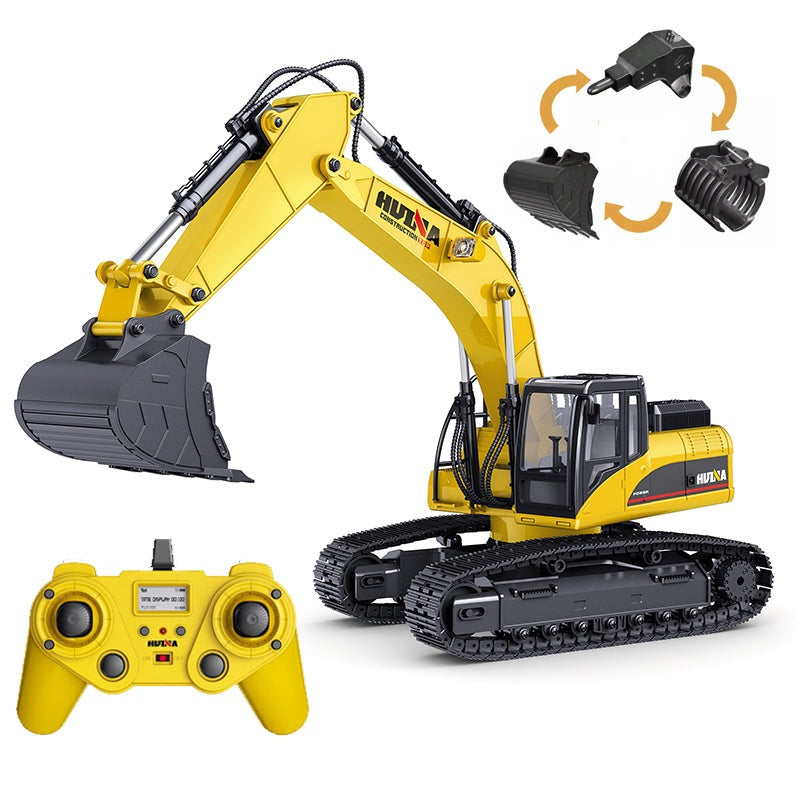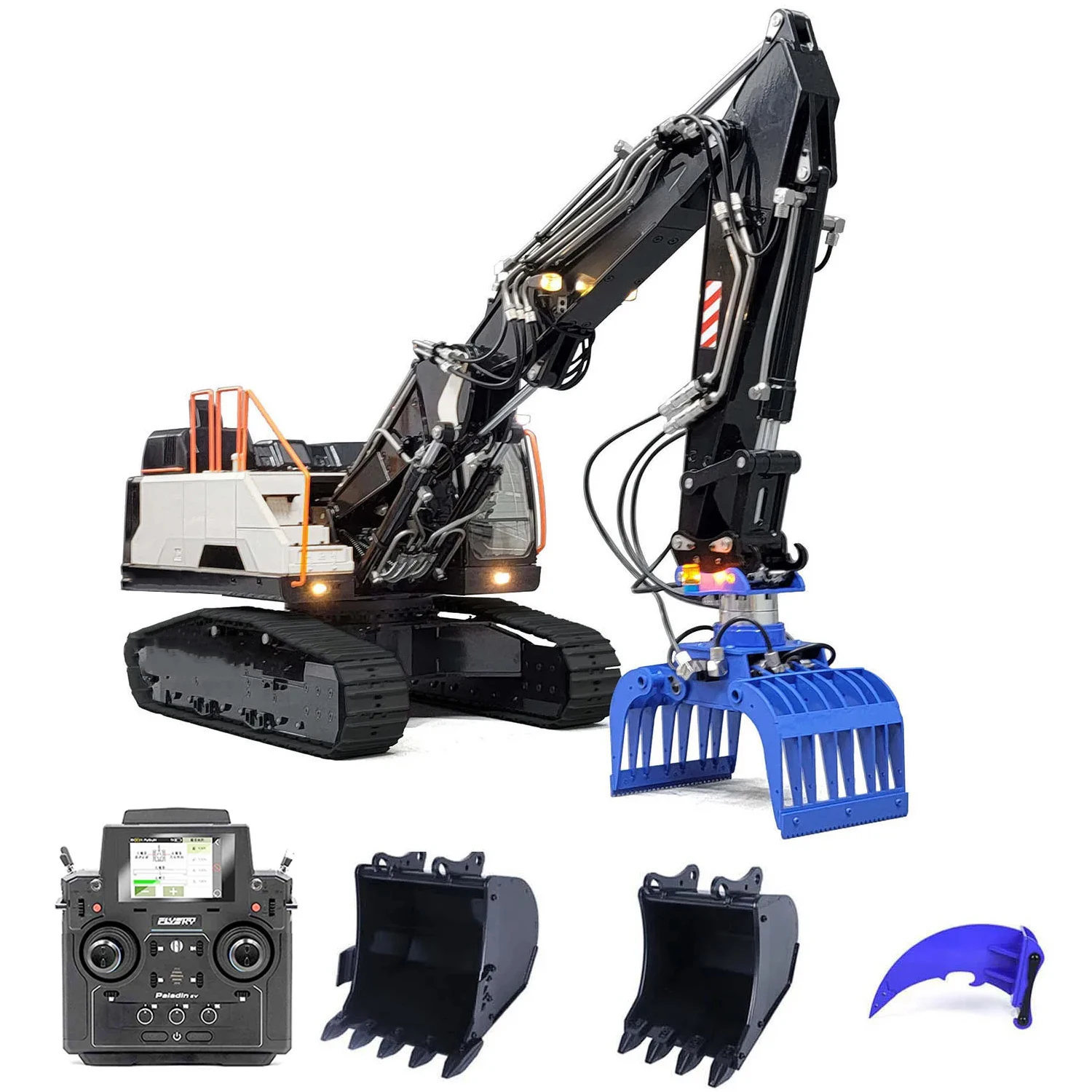Recognizing Exactly How Excavator Functions and Its Effect On Efficiency
Excavators play a vital duty in building and construction and mining operations, depending on an intricate interaction of hydraulic and mechanical systems. Their capacity to execute a selection of jobs depends upon both their design and the technology integrated within. Recognizing these parts can considerably affect functional efficiency and efficiency. As improvements proceed to improve the market, one need to take into consideration how these modifications will influence future practices and efficiency.
The Essentials of Excavator Mechanics

The Role of Hydraulic Systems in Excavators
At the heart of excavator operation exists the hydraulic system, which plays a pivotal duty in powering the machine's features and motions. This system uses pressurized hydraulic fluid to move energy, allowing numerous activities such as lifting, swinging, and excavating. By utilizing the principles of hydraulics, excavators can carry out jobs with amazing precision and force, boosting total operational efficiency.The hydraulic system is composed of vital parts, consisting of pumps, shutoffs, and cyndrical tubes, which function with each other to regulate the circulation and instructions of the fluid. When the operator engages the controls, the hydraulic fluid is routed to details cylinders, converting the operator's commands right into physical activity. This mechanism allows for receptive and smooth activities, which are vital in building and excavation settings. double e volvo rc excavator. The effectiveness of the hydraulic system straight influences the performance and convenience of the excavator, making it an indispensable element in modern-day excavation procedures
Secret Parts of an Excavator
Understanding the key components of an excavator is important for understanding just how this effective equipment runs. An excavator includes several significant elements, including the undercarriage, residence, boom, container, and arm. The undercarriage offers stability and wheelchair, frequently including wheels or tracks to navigate different surfaces. Your house consists of the engine and hydraulic systems, permitting the operator to regulate activity and power the device. The boom expands from your home, enabling vertical reach, while the arm attaches to the bucket, facilitating digging and training operations.Additionally, the taxicab houses the driver, geared up with controls for exact handling. Each of these parts plays an essential duty in the excavator's overall capability, adding to its efficiency and efficiency on building and construction websites. Understanding these parts assists in preserving and maximizing excavator performance, guaranteeing tasks are completed safely and efficiently.
Attachment Flexibility and Its Benefits
Attachment flexibility is a crucial aspect of excavators, making it possible for drivers to switch over between various tools tailored for specific jobs. This flexibility not just improves work efficiency yet additionally contributes to cost-effectiveness by decreasing the requirement for multiple makers. Comprehending the different types of attachments readily available can considerably affect the total performance and performance of an excavator on job sites.
Kinds of Accessories
While excavators are primarily recognized for their excavating abilities, their true convenience hinges on the broad selection of attachments readily available. These add-ons enhance the excavator's functionality, allowing it to carry out various tasks beyond excavation. Common attachments consist of pails (for excavating and scooping), hydraulic thumbs (for understanding products), and augers (for drilling openings) Grapples are made use of for managing and moving debris, while rippers can break up hard surface areas. Other specialized accessories, such as trenchers and plows, make it possible for excavators to adapt to details work needs. This diversity not only enhances the equipment's energy throughout different fields, including demolition, landscape design, and construction, yet also permits operators to tailor their tools to satisfy specific project needs efficiently.
Boosted Task Efficiency
Making the most of work efficiency is a primary benefit of making use of different excavator attachments. Various attachments enable an excavator to do multiple jobs without needing to change tools, saving important time and labor. Making use of a hydraulic hammer can break concrete while a bucket accessory can excavate dirt, enabling a seamless process. This adaptability lowers downtime connected with equipment modifications and boosts productivity on-site. Furthermore, specialized accessories boost accuracy in jobs such as grading or landscaping, resulting in greater quality results. The capacity to adjust to numerous job demands not just streamlines operations however additionally lessens the demand for added equipment, ensuring that jobs are finished quickly and successfully. Generally, accessory convenience substantially adds to increased job efficiency in excavation work.
Cost-Effectiveness and Adaptability
Cost-effectiveness is a significant advantage of making use of functional excavator accessories. These accessories enable a single excavator to do numerous jobs, lowering the requirement for added machinery and labor - double e volvo rc excavator. By changing between buckets, hammers, and grapples, operators can tackle numerous tasks, from excavating to demolition, consequently taking full advantage of devices use. This versatility not only lowers functional expenses but additionally lessens downtime connected with changing tools. Furthermore, the ability to tailor excavators with specialized add-ons boosts performance, as they can effectively handle varied jobs according to job demands. In conclusion, the combination of cost-effectiveness and convenience website link in excavator accessories adds to improved functional performance and resource allotment in construction and excavation jobs

Advanced Innovation in Modern Excavators
Modern excavators are progressively furnished with advanced innovation that go to my site changes excavation procedures. Automation improves procedures, while enhanced gas efficiency lowers functional expenses. Furthermore, wise control systems enhance precision and safety, marking a significant advancement in excavation equipment.
Automation in Excavation Processes
As excavation technology advances, automation has actually become a crucial component in boosting efficiency and accuracy on job websites. Modern excavators are geared up with advanced automated systems that promote tasks such as grading, excavating, and trenching with very little driver treatment. These systems use sensing units, GPS, and artificial intelligence formulas to guarantee precise placing and depth control, substantially minimizing the margin for mistake. Furthermore, automation permits operators to concentrate on strategic decision-making instead of hand-operated controls, causing boosted efficiency on the whole. Such developments not just improve operations but additionally boost safety by lessening human mistake in complex procedures. The combination of automation in excavation procedures represents a significant innovation in construction technology, driving the industry towards higher performance and effectiveness.
Improved Gas Performance
Innovations in technology have also resulted in considerable renovations in gas efficiency for contemporary excavators. Modern makers are geared up with sophisticated engines that enhance power output while decreasing fuel usage. These engines use ingenious burning modern technologies, such as turbocharging and direct fuel injection, to enhance performance and efficiency. Additionally, light-weight products in construction decrease general weight, enabling less energy expense throughout operation. The intro of variable rate controls allows operators to adjust engine performance according to specific tasks, further minimizing fuel use. As an outcome, these improvements not just reduced functional expenses however additionally add to ecological sustainability by reducing emissions. On the whole, improved fuel efficiency in excavators is a vital growth that reinforces efficiency and economic stability in the construction industry.
Smart Control Equipment
While drivers navigate significantly complicated job sites, smart control systems in excavators have arised as crucial devices for improving effectiveness and precision. These innovative innovations make use of formulas and sensors to check different parameters such as tons weight, terrain conditions, and functional performance. By instantly adjusting hydraulic features, smart systems enhance equipment performance, bring about improved performance and reduced wear on parts. Furthermore, drivers benefit from user-friendly user interfaces that offer real-time responses and diagnostics, enabling educated decision-making. This integration of innovation not just improves operations yet likewise decreases human error, adding to much safer work atmospheres. As the construction sector remains to develop, clever control systems will certainly play a vital role in shaping the future of excavator efficiency and efficiency.
Enhancing Functional Efficiency With Excavators
Excavators play a vital duty in improving functional effectiveness throughout numerous building and construction and excavation projects. Their versatility enables several tasks, including lifting, digging, and material handling, which simplifies workflows and minimizes the demand for extra devices. With effective hydraulic systems, excavators can execute durable jobs with precision, significantly lowering the time needed to total projects. The integration of innovative technology, such as GPS and automated controls, further check enhances their operation, enabling operators to accomplish better accuracy and reduce material waste. In addition, modern excavators are designed to eat much less gas and lessen discharges, adding to both price savings and environmental sustainability. By utilizing excavators effectively, construction teams can enhance productivity, meet project deadlines, and boost overall website administration. This multifunctionality and effectiveness make excavators crucial devices in the contemporary building landscape.
The Future of Excavators in Building and Mining Industries
As the construction and mining markets advance, the future of excavators is positioned for considerable improvement driven by technological technology and transforming functional needs. Advancements in automation and fabricated intelligence are improving excavator capacities, enabling improved accuracy and effectiveness in operations. Autonomous excavators are arising, minimizing the requirement for human treatment and lessening the risk of accidents.Moreover, the assimilation of telematics and IoT innovation makes it possible for real-time surveillance of machine efficiency and anticipating upkeep, optimizing uptime. Green designs, including hybrid and electrical models, are acquiring grip, straightening with sustainability goals within the industry.Additionally, making use of sophisticated products and lighter layouts enhances fuel effectiveness while keeping performance requirements. As these fads development, excavators will play an important function in fulfilling the enhancing needs for efficiency and safety and security in construction and mining, ultimately transforming operational landscapes.
Often Asked Inquiries
Exactly How Do Weather Condition Problems Affect Excavator Performance?

Weather greatly influence excavator performance, as rain and mud can hinder traction and stability, while severe temperature levels may affect hydraulic systems. Operators should adapt to these variables to guarantee optimal performance and safety during operations.
What Precaution Should Operators Adhere To While Using Excavators?
Safety and security measures for excavator drivers include using suitable individual safety equipment, conducting pre-operation assessments, making sure appropriate communication with ground workers, preserving a risk-free distance from above dangers, and sticking to well established operational methods to avoid mishaps.
How Frequently Should Excavators Be Maintained for Optimal Efficiency?
Excavators should be preserved routinely to ensure peak efficiency, generally every 250 operating hours or as defined by the supplier. Routine checks improve integrity, prevent unforeseen failures, and expand the lifespan of the devices.
What Is the Ordinary Life Expectancy of an Excavator?
The typical lifespan of an excavator typically varies from 10,000 to 15,000 hours of operation. Elements affecting long life include maintenance techniques, operating conditions, and the top quality of the maker itself, impacting total productivity and performance.

Can Excavators Operate Unequal Terrain Successfully?
Excavators can run successfully on irregular surface because of their verbalized layouts and adjustable tracks. These attributes enable them to keep security and grip, making it possible for reliable procedure in difficult atmospheres typically experienced in building and construction and landscape design tasks. Each of these components plays a crucial function in the excavator's total capability, adding to its performance and performance on construction sites. Optimizing work effectiveness is a key benefit of using different excavator accessories. While drivers navigate progressively complicated task sites, smart control systems in excavators have emerged as essential devices for boosting performance and accuracy. Excavators play an essential duty in boosting functional effectiveness across different construction and excavation projects. Advancements in automation and artificial knowledge are improving excavator capacities, allowing for enhanced precision and effectiveness in operations.
Comments on “Maximizing Excavation Productivity with a rc excavator: Best Practices”